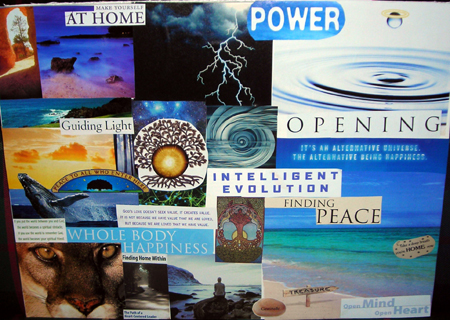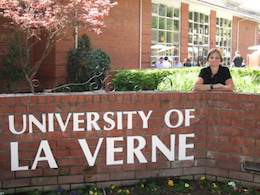In celebration of today’s International Day for Sharing Life Stories, here’s a little piece of my story:
Martha Beck recently told me everything I did wrong with my vision board in 2008.
So what’s a vision board, who’s Martha Beck, and what does any of this have to do with storytelling?
A vision board, says the site WikiHow, “is a collage of images, pictures and affirmations of your dreams and desires. It can also be called a dream board, treasure map or vision map.”
The sample shown at right is from EvolvingTimes.com. A vision board is a way to visualize your goals. Here’s where it gets very woo-woo, new-age-y: Supposedly, says the Squidoo lens on vision boards :
:
The law of attraction states, that which is like unto itself is drawn. What that means is if you are maintaining a vibration that matches what you are wanting, more things will come your way to make you feel that way. … A vision board is a tool to help you create a matching vibration to what it is you want to have/be or do in your life and in your world.
I submit that a vision board facilitates a kind of storytelling because it enables the user to craft a visual representation of a future story for himself or herself.
In 2008, I was experiencing the last gasp of my unsuccessful search for a new job teaching at the university level. I had made the short list of finalists for a position at a Southern California university and had been invited for a campus visit, a.k.a., a grueling day of interviews, a research presentation, and a teaching demonstration.
Oh man, how I wanted that job … and how I was absolutely sure I would get it. I had a slight networking “in” in that I had met a member of the search committee. The school was similar to the one at which I had taught for more than six years, and it was facing an accreditation process that I knew a lot about.
Around the time I was prepping for the campus visit, I learned about visions boards, so I decided to create one about my desire to teach at this California university. I cut out a picture of a wall with the school’s name on it and then cut out a photo of myself and pasted it so that I was standing behind the wall. I surrounded this main image with photos of the university’s campus.
I stared and stared at the finished vision board, trying to manifest the idea of me belonging on that campus. I carried the board around with me everywhere, including to the campus visit.
 Arriving a few days early, I underscored my manifestation of success by having Randall shoot a real photo (at left) of me in the actual spot in which I had collaged myself on my vision board.
Arriving a few days early, I underscored my manifestation of success by having Randall shoot a real photo (at left) of me in the actual spot in which I had collaged myself on my vision board.
I should have caught on pretty quickly during the campus visit that the outcome would not go my way. The chair of the search committee did not even show up for my visit. His wife, also on the committee, told me he was suffering from allergies. The day was set up with a lot of downtime for me, the candidate, which seemed both considerate and a poor use of time. I spent a lot of time hanging out in the office of a search-committee member. We could have used that time to get to know each other better, but she didn’t talk to me much, and I didn’t engage her because I could see she was busy. A faculty member knocked me off my game during my research presentation by asking a question, though I had asked the audience to hold questions until the end (amusingly, the question was “How do you define storytelling?”). And only two members of the committee bothered to show up for my teaching demo. I should have realized the search committee was just going through the motions. But I was in denial because I so wanted the job.
I went home to Florida. Weeks passed with no word. I’m not sure the committee ever would have told me I didn’t get the job had I not pestered the committee member I was acquainted with.
The vision board had failed. I decided vision boards were a bunch of hooey and that I would never fall for anything like them again.
I had no intention of reading Martha Beck’s column on vision boards in the June 2010 O Magazine, but I really like Beck’s writing, and I was curious.
So, let’s say I don’t think vision boards are hooey. Let’s say I believe in them and assume that I did something wrong with mine in 2008. What does Beck say I messed up?
If I thought Basic Vision Board was woo-woo/new-age-y, Beck was even more so, and I don’t totally follow everything.
First, I apparently shouldn’t have been so literal and specific with my images. Beck says eschew the familiar in favor of the unfamiliar, “images that trigger physical reactions.” Unstated but implicit is the idea that I should not have created a vision board for a specific want but rather a more general feeling for what I wanted in the future.
Next, all that staring and manifesting was exactly the opposite of what I should have done, according to Beck. I should have stopped thinking about it and even lost or recycled my vision board. “The biggest mistake aspiring reality creators make,” Beck writes, “… is continuing to push something you’ve already set in motion.”
Beck’s prescribed third step is to be ready to take action when the reality you want presents itself. I may have gotten this step right.
Because here’s the thing … If I had gotten that job, we would have had to move to Southern California. The town in which the university is located is idyllic, but as for the rest of Southern Cal … ewwwww (no offense to those who like it there). A few months after the abortive Southern California experience, Randall stumbled upon cheap land in Washington state. That September we traveled to Washington, fell in love with a piece of land in Kettle Falls, and bought it. Last year we started building our house and decided to move here permanently (instead of being bi-coastal as we thought we would). And this year, here we are, deliriously happy permanent residents in an almost-finished house.
I thought I wanted a certain vision, a specific future story. But the Universe had other plans for me.
I’m thinking my vision board worked after all.
If you are considering the possibility that vision boards aren’t a bunch of hooey and are interested in learning more, you can find all kinds of resources by Googling “vision board.” You can even find vision-board Web applications, like Oprah’s (registration required).
